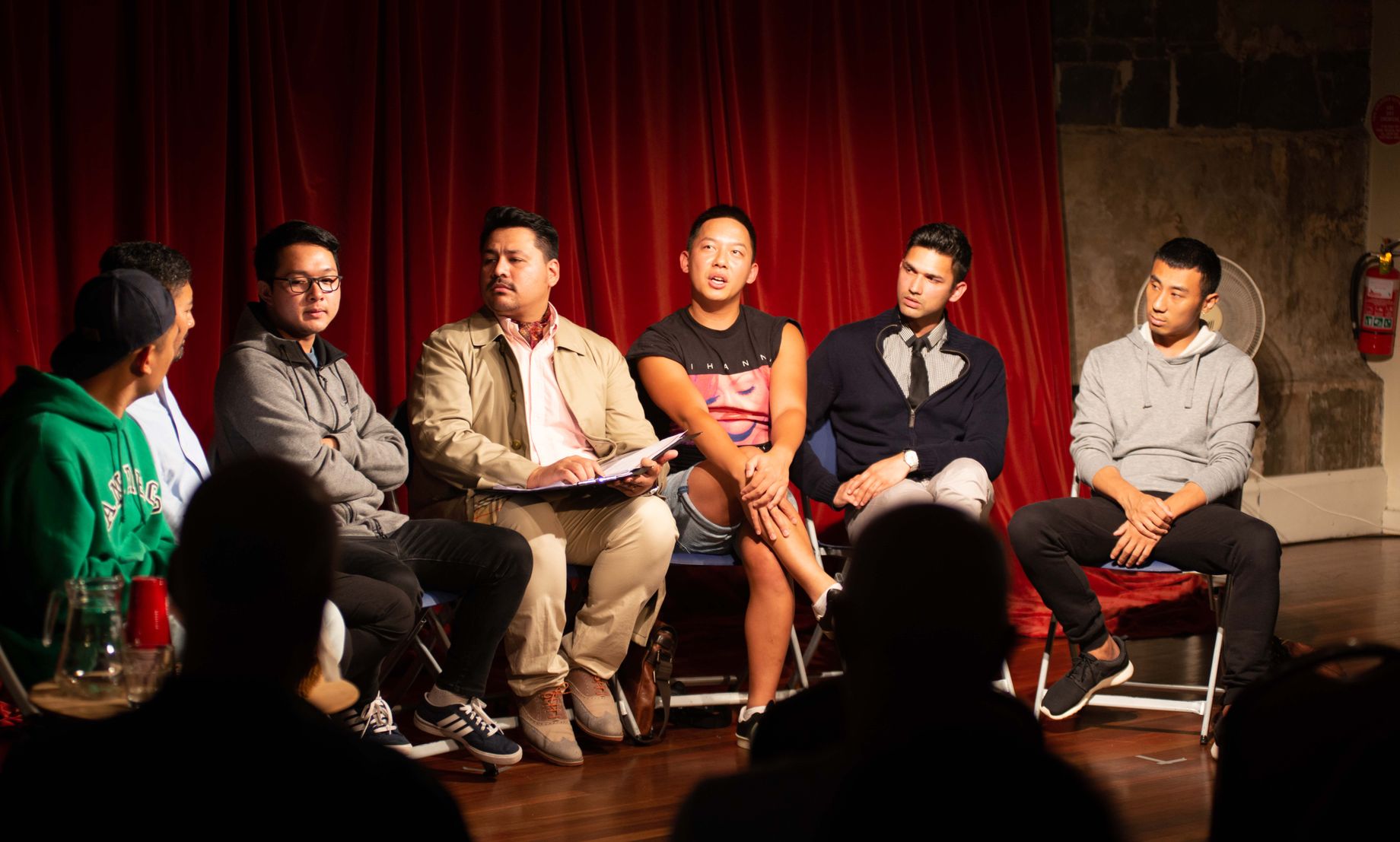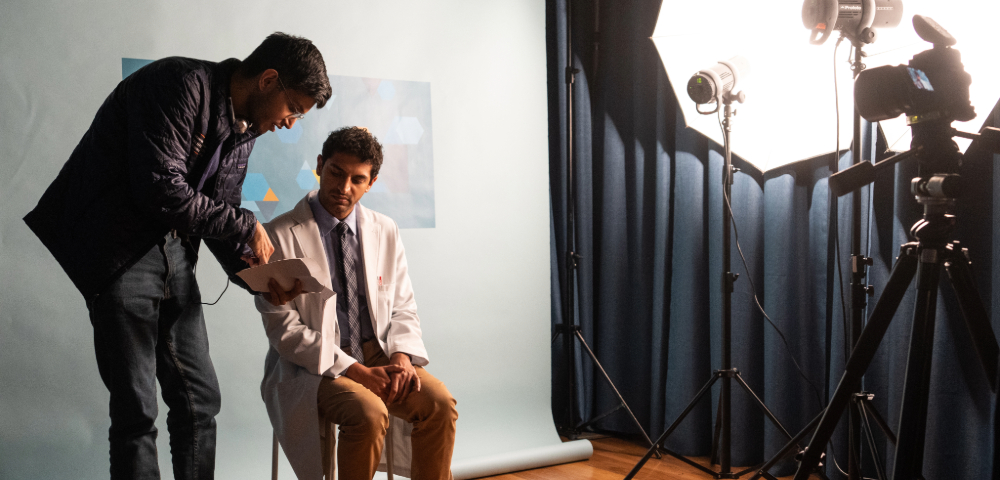
Review: ‘Queer Asians Anonymous’ at Midsumma Festival

As part of this year’s Midsumma Festival in Melbourne, a new work called Queer Asians Anonymous was created and performed by the volunteer members of the Queer Asians Theatre Project.
The three-act play, staged in the Basement Theatre at the Footscray Community Arts Centre, focuses on a support group for queer Asian men who gather to discuss issues and events affecting their lives.
The production ran for six nights, and I had the fabulous opportunity to attend a Friday evening show.
PLOT SUMMARY
The play revolves around a Melbourne support group for queer men from Asian backgrounds.
The characters form a circle on set with the facilitator leading the sessions, which develop during the play into a more open and nuanced discussion on what it means to be queer and Asian in Australia.
There are eight roles within the play; all except one of the characters are of Asian descent. This in itself sets Queer Asians Anonymous apart from the outset as different from the usual Midsumma servings of sexy or romantic and mostly white, Australian fare.
The Asian men are from varying backgrounds, with different mores and hopes for a better future.
The setting would be familiar to many Melburnian men in the audience who have attended local peer support groups such as ‘Young and Gay’ or ‘Momentum’.
Midway through the first act, the focus changes. One character convincingly states his views which ultimately challenges the status quo of the other characters who he believes have not ‘opened their eyes’ to the injustices within the Melbourne queer community.
It is this interaction between the characters that drives the plot to its eventual conclusion.
The absence of an elevated stage means there is minimal separation from the actors, so that it was easy for the audience to be drawn in to the characters as their stories were told, due to the small intimate space.
“NO CURRY, NO RICE”
The use of the ‘other’ as a plot device serves well to highlight the levels of acceptance within all our communities.
Racism within the wider Australian community is a major theme of the play, but it is also broken down into the racism experienced in the queer community as well.
The prevalence of sexual racism that is evident on the gay dating apps, for example, speaks volumes of a condescending attitude held by some towards those who do not fit a certain look.
The play poses the question: Has the queer community, having lived in the shadows of the mainstream for so long, managed to avoid scrutinising its own racism?
One might expect that those who have experienced the discrimination of homophobia would act more kindly to those who experience other forms of discrimination. This leads to a scrutiny of the racist attitudes and ‘othering’ of some Asians towards other Asians, and anti-Muslim attitudes.
Perhaps, we as humans have always ‘othered’ minority groups as it is simply part of our survival instinct for self-preservation. The deep harm caused by underlying attitudes about race, amplified by sexism as well as homophobia, and then internalised, manifests itself in the toxic masculinity evident in one particular character.
ENJOYING SOME FRESH AIR
A ten-minute intermission between Acts One and Two was an opportunity for the audience to stretch our legs and perhaps grab a drink at a nearby café, as I did.
I needed the fresh air as I strolled down to the banks of the Maribyrnong River because the characters were painfully familiar to me as a queer Asian man.
On a primal level, it was challenging to watch, and in parts of the play and aspects of each character, it felt like peering at my own reflection.
I briefly went back down my own memory lane twenty years or so, when I myself could have easily been one of the protagonists.
I had participated in a similar support group. In fact, during the very first iteration of Gay Asian Proud, I remember discussing racism, way back then. Strange that the demographics have changed in the intervening decades but the attitudes haven’t, really.
STAND OUT PERFORMERS
The unapologetically cynical but thoughtful, Malaysian-born Trekkie Goh (played byHayden Keth) presents as an awkward character at the beginning, more interested in computer games than engaging with the gay scene.
Goh’s sensitivity regarding injustice and his activism develops as the play progresses, until its dramatic conclusion where he comes across as very much the ‘hero’, having drawn his own conclusions about the group and its leadership.
The character Goh was played with both humour and authenticity. Goh’s monologue in Act Two was pivotal to the story and commanded a sense of awe from the audience by the delivery in that emotional moment.
In the play, Goh is instrumental in establishing a more inclusive and diverse conversation among queer Asians.
As a consequence of some unexpected changes on the night, Rhys, who is the only non-Asian character in the play, had to be improvised using voice-overs and a mannequin.
Rhys is a white Australian gay cis male who is exclusively attracted to Asian men. However, his attitude to Asian people in general may be described as condescending.
The improvisation turned out to be a masterstroke for the play as, suddenly an element of comedy was added to the show; the visual frozenness and automated voice also accentuated the woodenness of the character. This provided for another standout moment in the play.
FINAL THOUGHTS
“It’s an important conversation that needs to be had and is very hard to get started, so it’s good to see the guys taking that first step!”
– Mikhael, a white, gay, cis-male
We can succeed at tackling the issues facing all of us, the minorities within this larger minority that is the queer community, by starting to talk about it.
We are no longer in the shadow of mainstream Australian society but emerging out of that shadow in modern times of increased legal and social acceptance.
There is plenty more to talk about, and the conversation has started. Perhaps this work by Queer Asians Theatre Project will move that conversation along.
Hopefully there will be an assortment of voices heard at that table.
I recommend people see any future productions that the Queer Asians Theatre Project put on. I thoroughly enjoyed the reflective experience and appreciate the hard work and countless hours that have been put in to create the successful production of Queer Asians Anonymous.
Congratulations to everyone involved.









